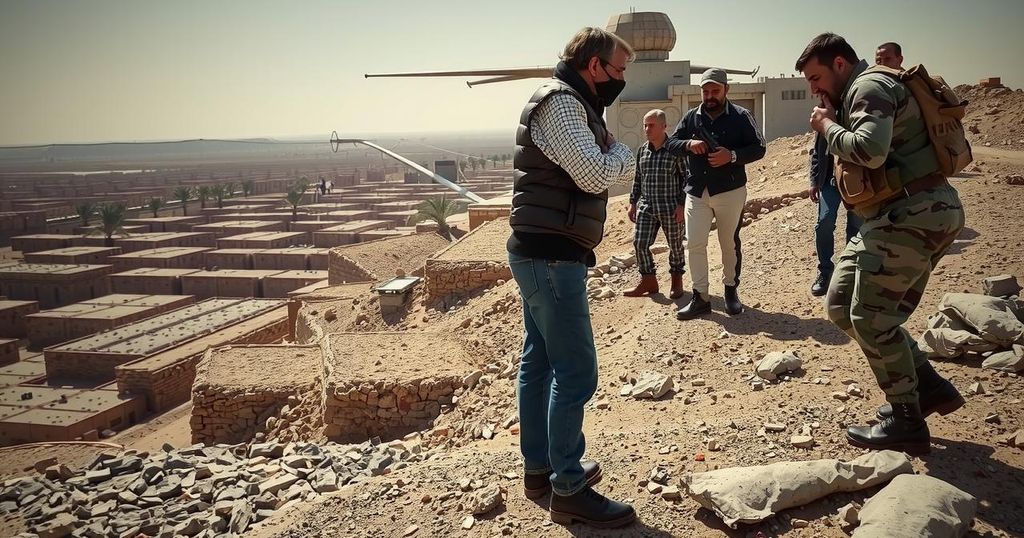Kurds in Syria Seek Substantial Support from Israel Amid Turkish Threats

Kurdish communities in Syria seek actionable support from Israel amid escalating threats from Turkey and extremist militias. The Syrian Democratic Forces (SDF) have been vital in combating ISIS, yet they face ongoing military aggression. Many Kurds express hope for sustained Israeli involvement to ensure their security and autonomy in the face of Turkish endeavors to expand its influence in the region.
On December 18, 2022, Israeli Foreign Minister Gideon Sa’ar met with Jens Plotner, the Foreign Policy and Security Advisor to the German Chancellor. Sa’ar articulated the necessity for the international community to protect minorities in Syria, particularly the besieged Kurdish population. Various Kurdish leaders express hope that Israel’s support will transcend mere verbal commitments, emphasizing a need for actionable assistance against the threats they encounter. Many Kurds are notably apprehensive that Turkey may exploit Syria’s chaotic environment to target areas like Kobani, reminiscent of Turkey’s previous assaults in 2018, which resulted in the displacement of over 150,000 Kurds from Afrin.
Currently, Turkish-backed militias continue to threaten Kurdish-held regions in northeastern Syria. The Syrian Democratic Forces (SDF), which includes primarily Kurdish fighters, were established with US support in 2015 to combat ISIS and have played a vital role in defeating the group by 2019. Despite their success, the SDF finds itself at odds with Turkey, which labels the group as terrorists due to its purported ties to the PKK. In maintaining military operations against the SDF, Turkey has allied with extremist groups, such as the Syrian National Army (SNA), known for human rights abuses, including kidnapping and murder.
SDF territorial gains include key cities such as Kobani, Qamishli, and Raqqa, positioning them strategically against ongoing threats from Turkey, ISIS remnants, and the SNA. Amidst this, the SDF’s leadership must navigate the evolving dynamics with the Syrian government, which has taken a less hostile stance towards Kurdish factions compared to their Turkish counterparts. Frequent aerial assaults from Turkish drones and artillery strikes by the SNA exacerbate the dire situation, prompting concerns among Kurds about the future integrity of their territories.
The prevailing sentiment among the Kurdish population is one of uncertainty regarding Israel’s commitment to their safety. Many Kurds express a desire for concrete military support, including aerial assistance for the SDF, fearing that Turkish and Qatari-backed elements might initiate further assaults akin to support for Hamas prior to October 2023. While there are speculations about covert cooperation between Israel and the SDF or the broader Coalition, the Kurdish populace remains primarily yearning for definitive action rather than idle promises.
Despite the SDF’s effectiveness in combating ISIS, its visibility has also made it a target for Turkish aggression, with Ankara striving to expel both the SDF and US forces from Syria. The current geopolitical landscape sees Turkey attempting to exert increased influence following the perceived withdrawal of Russian and Iranian support in the region. The apprehension in Kobani, a city symbolizing Kurdish resistance, remains palpable as residents strive to contend with their precarious security situation amidst Turkey’s aggressive posturing.
In summary, Kurdish communities in Syria are urgently anticipating substantive support from Israel to ensure their safety against ongoing Turkish military operations. The need for international assistance, particularly from Israel, is more pressing than ever, with many expressing hope that Israel’s involvement will translate into protective measures that honor the Kurdish minority in eastern Syria.
The plight of Kurdish populations in Syria has become increasingly precarious, particularly amidst ongoing conflicts involving Turkey, the Syrian government, and extremist militias. In 2018, Turkey targeted Kurdish regions, resulting in substantial displacement and oppression of Kurdish communities. The SDF, backed by the United States, has successfully fought against ISIS, advocating for Kurdish rights and autonomy in northeastern Syria but now faces escalating threats from both Turkey and associated armed groups. The strategic importance of Kurdish territories has heightened international interest, with voices clamoring for support to stave off further incursions and violence.
In conclusion, the hopes of the Kurdish people in Syria hinge on active international engagement, particularly from Israel, which they perceive as crucial to their security and autonomy. Given the historical precedents of Turkish aggression and the effectiveness of the SDF against ISIS, a decisive response from Israel could significantly influence the stability of the region. As the geopolitical landscape continues to shift, the commitment of external powers to safeguard the Kurdish minority will be critical in determining their future safety and prosperity.
Original Source: www.jpost.com








